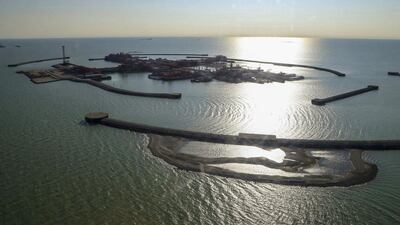Abu Dhabi investors should look to Kazakhstan for expansion opportunities while it is still cheap to enter its energy sector, according to the chief executive of an oil producer active in the country.
Market fundamentals look positive, with Kazakhstan growing at 6 per cent annually, and the country aiming to produce 2 million barrels per day by 2020.
The Kazakh government is planning new tendering rounds over the next year, when it will award new exploration blocks.
“Opportunities exist for energy firms across the spectrum, because the Kazakh government is actively pushing to increase [output],” said Don Streu, chief executive of Condor Petroleum. “National oil companies and energy juniors from the Middle East should pursue Kazakh opportunities right now as entry valuations are attractive.”
Mr Streu said that Mubadala Petroleum, Ipic, Taqa and Dragon oil would all be well-placed to benefit from investing in the Kazakh energy industry.
“Kazakhstan offers an opportunity for Abu Dhabi oil companies to diversify their supply sources so they don’t rely solely on domestic production,” he said.
Condor Petroleum said it had identified 1.5 billion barrels of recoverable oil.
But the country’s oilfields have presented international firms with technical challenges.
The country’s US$50 billion Kashagan oilfield, with estimated recoverable reserves of up to 13 billion barrels, is operated by a consortium that includes Eni, Exxon Mobil, Royal Dutch Shell, Total, and a state-owned Kazakh firm, KazMunaiGas. It was forced to stop production after a hostile environment caused problems for engineers.
In April, production was halted after kilometres of pipeline were found to be defective.
This was due to extreme water pressure alongside very high concentrations of hydrogen sulphide, which is a flammable, poisonous gas that can dissolve metal.
But the Kashagan project also has to cope with pack ice, occasional freezing of water surrounding pipes, the building of pipeline through swampland and the construction of artificial islands to harvest the oil.
Kashagan is a very large part of the country’s oil production, said Julia Nanay, an analyst at IHS Energy.
“Meeting production targets after this year could be problematic without Kashagan,” she said.
“The goal of compensating Kashagan’s “lost” barrels in 2014 can be achieved by either containing declines at some of the older fields or pushing more barrels out of fields with flat or rising output or a combination of both.”
On Wednesday, the Kazakh oil minister, Uzakbai Karabalin, said production could resume in 2016.
Mr Streu was confident that most technical problems faced by energy firms in Kazakhstan could be overcome.
“Sour oil and gas … contain[ing] high percentages of hydrogen sulphide, is encountered in numerous fields worldwide. The industry has developed the ability safely to deal with hydrogen sulphide,” he said.
And while “some of the offshore oilfields in the Caspian Sea have to deal with ice flows during the winter season … this challenge has also been overcome,” he said.
Austria’s OMV, in which Ipic holds a stake, said this month that it would take a €110 million (Dh452.5m) impairment in Kazakhstan due to unsuccessful field redevelopment. OMV operates four producing onshore oilfields; Tasbulat, Turkmenoi, Aktas and Komsomolskoye in the Mangistau region of West Kazakhstan near the Caspian Sea, according to its website.
Kazakhstan’s positive macroeconomic outlook, driven by rising oil revenue, is a cause for optimism, analysts say.
“Kazakhstan was the first to pay off its International Monetary Fund debts following economic reconstruction in 2000, seven years ahead of schedule; it was the first regional state to obtain a favourable credit rating; the first to implement financial institutions approaching western standards of efficiency and reliability; and the first to develop and introduce a national, fully funded pension programme,” John Daly, an academic who covers Kazakhstan, wrote in the May issue of the Central Asia-Caucasus Institute Analyst journal.
The government intends to take advantage of this benign environment to follow a model of export-oriented industrialisation.
Richard Weitz, writing in the March issue of the same journal, said that Kazakhstan should take advantage of “rising global demand for [its] energy products to construct a strong manufacturing sector and follow the successful modernisation paths of Singapore, South Korea, and the other already successfully industrialising states”.
Easy access to the Chinese market is another boost to producers. Construction of the Atasu-Alashankou oil pipeline between Kazakhstan and Xinjiang in China, which is expected to have a maximum capacity of 20 million tonnes per year, began transporting oil in 2005.
“Given Kazakhstan’s close proximity and access to China, it competes very favourably with other countries striving to meet China’s energy needs,” Mr Streu said.
Kazakhstan has been working to attract international investment into its energy and other industrial sectors.
KazMunaiGas is weighing a potential stock market flotation in London, media reported last month.
Last November, DP World and the Kazakhstan national railway company, Kazakhstan Temir Zholy, signed an agreement for DP World to provide management services for the development of the new Khorgos Special Economic Zone and Inland Container Depot. DP World is also providing similar services under a separate contract at the Port of Aktau, Kazakhstan’s main cargo and bulk terminal on the Caspian Sea.
abouyamourn@thenational.ae
Follow The National's Business section on Twitter

